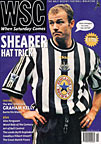 A new football film is in production in Scotland. Geoff Leonard went along to see what all the fuss is about
A new football film is in production in Scotland. Geoff Leonard went along to see what all the fuss is about
The Arsenal Stadium Mystery, Escape To Victory, Sean Bean’s When Saturday Comes. The link? As I’m sure you know, all were attempts at football films which turned out to be trite rubbish. Robert Duvall’s new movie The Cup, however, promises to be rubbish on an altogether grander scale.
The basic plot, as far as I can tell, involves a fictitious Scottish Third Division outfit, improbably called Kilnockie, enjoying a spectacular Cup run. As if this wasn’t stretching credulity quite far enough, the underdogs find themselves visiting Queen of the South in the quarter-finals. So it was that on August 15th I had the dubious privilege of being among a few thousand extras as scenes for the film were shot at Queens’ Palmerston Park.
Of course I had some reservations about the entire project, but was glad to note that among the scarves and flags available for visiting “fans”, rosettes and rattles were rare. Indeed, Palmerston would actually have looked like it was housing something resembling a football crowd, were it not for the fact that too many people were clearly enjoying themselves.
Prior to kick-off, the script was altered to ensure that, rather than beating Queens 3-1, Kilnockie would instead emerge 3-2 winners. Queens chairman Norman Blount explained: “I took the scriptwriter out to dinner and impressed on him that we never lose 3-1 at home.” I’ll leave you to guess the score when we entertained Hearts in the League Cup three days later.
Before the choreographed scenes were shot, the teams were asked just to play for a while as the cameras rolled. The “game” which unfolded was so tame that even the Airdrie players who’d been drafted in to represent Kilnockie weren’t committing fouls. Soon though, some goals had to be staged. Queens’ striker Stevie Mallan was asked to turn a defender on the edge of the box before scoring. As the ball arrived at his feet, he promptly stood on it and collapsed as if picked off by a sniper. Personally, I thought that in terms of authenticity, the episode would be hard to match, but the director decided on a retake.
Then, of course, Kilnockie had to reply, and their goals were to come from “Jackie McQuillan”, played by the tiresome Ally McCoist. He managed to score once in every eight or nine attempts, a bit like his Scotland ratio in fact. Indeed, the highlight for me was being encouraged to swear at him after he’d earned a sending-off for punching someone. He then took trackside abuse from his “manager”, Robert Duvall himself, who insisted on wearing the type of costume that Barry Venison would consider dated.
Added to the enjoyably surreal nature of the afternoon, however, were a few disheartening elements. The attendance, for instance, was six times larger than that for our next league game. Many of those present thought the appropriate response to an opposition goal was good natured and gormless booing rather than sullen silence. I also felt the club could have exploited the situation better, perhaps by offering cheap tickets for subsequent games to the extras. The chairman speaks of a “raised profile” and “spin-offs”, but I’m not convinced that Watford’s success of the Eighties owed much to their involvement in Murphy’s Mob.
The film has received significant media attention in Scotland but informed observers, as well as radio pundits like James Traynor, are already describing the whole thing as “boring”. But until Queens really do reach a quarter-final and get drawn at home against Third Division strugglers with a crap centre forward, I suppose I’ll have to make do with it.
From WSC 152 October 1999. What was happening this month